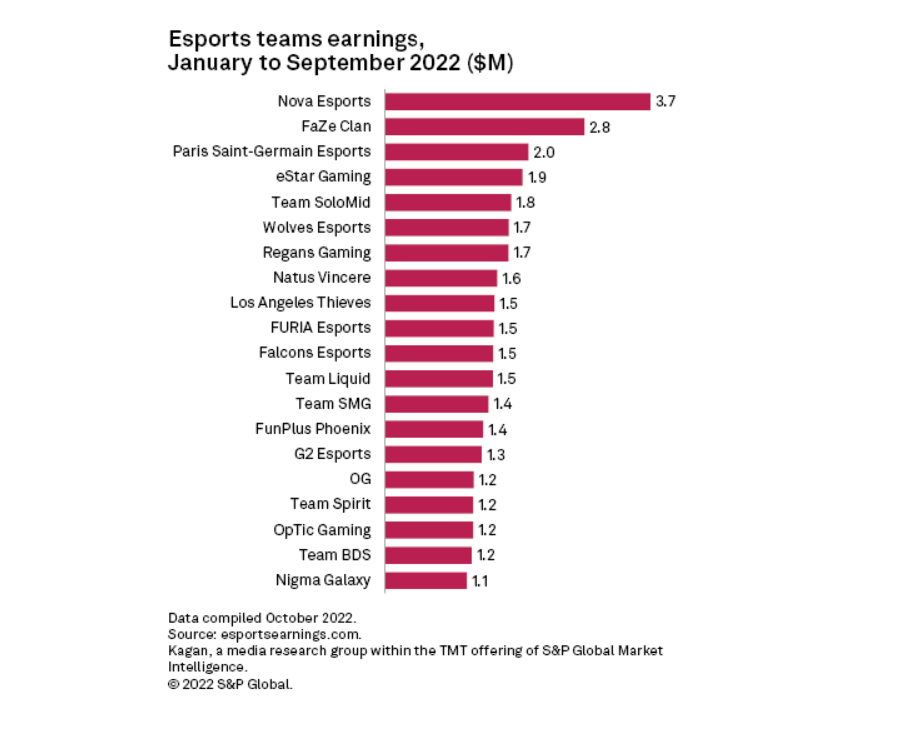S&P Global Offerings
Featured Topics
Featured Products
Events
S&P Global Offerings
Featured Topics
Featured Products
Events
S&P Global Offerings
Featured Topics
Featured Products
Events
S&P Global Offerings
Featured Topics
Featured Products
Events
Corporations
Financial Institutions
Banking & Capital Markets
Economy & Finance
Energy Transition & Sustainability
Technology & Innovation
Podcasts & Newsletters
Corporations
Financial Institutions
Banking & Capital Markets
Economy & Finance
Energy Transition & Sustainability
Technology & Innovation
Podcasts & Newsletters
Research — 1 Nov, 2022
Highlights
Esports team investors span private and public companies, as well as start-up venture capital
Gaming audiences are a key attraction for investors who are keen to reach young and digitally engaged demographics
Over half of the top 20 teams on a prize money basis are based in China or the U.S.
Global investment strategies surrounding holdings in esports teams fall into a few categories. Investors including venture capital and public and private companies are taking stakes in existing teams or creating esports divisions out of existing brands and franchises. Investors are also forming new teams to specialize in specific gaming genres or on certain gaming platforms.
Nova Esports (Hong Kong) Ltd. leads the way in year-to-date prize money revenue for 2022, according to Esports Earnings, a community-generated industry research platform. The Hong Kong-listed company Imperium Technology Group Ltd. acquired Nova Esports in 2020. The holding company's main interest is in manufacturing and selling furniture and other household products, with further interests in property and publishing, suggesting its esports involvement is due to the sector's unique growth opportunity.
FaZe Clan, which now trades on the Nasdaq as FaZe Holdings Inc is in second place in terms of 2022 prize money but is arguably the most prominent esports team in terms of volume of high-profile commercial partnerships. In third place is Paris St Germain eSports, a division of the French soccer team of the same name, which is owned by Qatar Sports Investments. The soccer team has had success with digital engagement with this strategy, able to sustain and grow a global digital following through esports.

The war in Ukraine has begun to affect esports. Located in Moscow, Team Spirit has lost the backing of one of its supporters, Parimatch Tech, due to the conflict. Team Spirit has dropped to 17th place for total prize earnings so far in 2022 after leading in 2021 revenue with $18.8 million. In 2021, Team Spirit won The International 2021, a Dota 2 tournament, which had the largest single prize in esports history, at $18 million. The esports team has recently announced plans to relocate to Serbia because of the conflict.
Top earner Og Esports A/S competes in three main esports events. Dota 2, Counter Strike:Global Offensive (CS: GO) and Valorant are all variants of the shooter game format, and the team has been very successful. Its biggest prize and one of the largest in esports history was $11.2 million in the 2019 Dota 2 event. The team attracts a range of sponsorships, including BMW, Red Bull, 1XBet and Steel Series. OG was co-founded by Johan Sundstein, who plays in the Dota 2 team.
Total prize money does not tell the complete story because there are vast differences in the levels of participation of esports teams. Some teams compete in several hundreds of tournaments each year while others will specialize in certain competitions. The best-performing teams vary significantly in terms of total revenue earned from 2018-2022.
Top 10 Total Prize Money Earned 2018-2022
Teams from China dominated the highest average earned per tournament from 2018-2022, making up seven of the top 10 places. The best performing of these was Weibo Gaming, formerly Turnso Gaming. However, the team only played one tournament each in 2018 and 2019 and three in 2020, with all the prize money coming from the game Arena of Valor. Social media platform Weibo Corp. acquired the team in 2020 and rebranded it.
Of the teams in our analysis, China had the highest number of teams earning prize money. Vici Gaming has earned $8.5 million since 2018, Invictus Gaming has earned $7.5 million and eStar Gaming has earned $6.8 million. Teams from the United States were in second place, with top-earning team FaZe Clan making $11.5 million, Evil Geniuses getting $9.2 million and Team SoloMid having $7.0 million.
Companies both with and without gaming ties are investing in the esports industry. In China, some of the larger companies involved in esports ownership include HUYA Inc., which owns team Royal Never Give Up. China's biggest social media company Weibo owns Weibo Gaming, and internet technology company NetEase (Hangzhou) Network Co. Ltd. owns Shanghai Dragons. Vici Gaming, one of China's most successful teams, has had investment from the Chinese NBA star Jeremy Lin.
Teams in the U.S. have backing from large conglomerates including Cox Enterprises Inc., which owns Atlanta FaZe and lists Autotrader among their other brands. Evil Geniuses owner Peak6 Investments operates in capital management and insurance, among other markets.
Paris Saint-Germain, backed by Qatar Sports Investment, is not the only soccer team to sense the opportunity of esports. England's Manchester City, the Netherlands' Ajax, Germany's Bayern Munich and Italy's AS Roma have started to develop their involvement in the sport. Wolfsburg from Germany, West Ham from England, and Besiktas from Turkey are also developing their esports capabilities.
Article
Webinar
